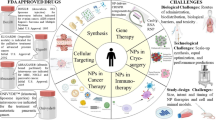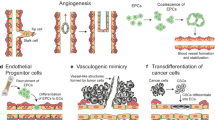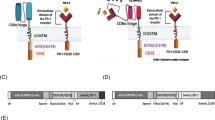Abstract
Novel treatment strategies such as gene therapy are warranted in view of the failure of current treatment approaches to cure a high percentage of patients with advanced bladder cancers. Testing of the hypothesis that blocking the angiogenic switch may keep tumour growth in check has been facilitated by the discovery of endogenous inhibitors of angiogenesis and has also added another research dimension to the field of cancer gene therapy. Consequently, the concept of targeting the tumour vasculature with anti-angiogenic agents has emerged as an attractive new strategy in the treatment of cancer. Targeted biological therapies that selectively interfere with tumour angiogenesis could improve survival among patients with bladder cancer. Endostatin is a tumour-derived angiogenesis inhibitor and is the first endogenous inhibitor of angiogenesis to be indentified in a matrix protein. Gene therapy represents an attractive approach to treat cancers and other chronic diseases. The development of an effective delivery system is absolutely critical to the usefulness and safety of gene therapy. At present, the adeno-associated virus (AAV) vector has the most promising potential in view of its non-pathogenicity, wide tropisms and long-term transgene expression in vivo. Gene therapy studies using different serotypes of recombinant AAV (rAAV) as delivery vehicles have proved rAAVs to be an effective modality of cancer gene therapy. In the present study, an IgG fragment was inserted at the start of the sequence coding for endostatin with the aim of enabling continuous secretion of endostatin the serum. We also investigated the suppression effect of AAV-mediated endostatin expression on endothelial cells and in mice xenograft models of bladder cancer. Our data demonstrates that rAAV-endostatin controlled tumour cell growth and achieves strong anti-tumour efficacy in vivo.








Similar content being viewed by others
References
Malkowicz SB. Intravesical therapy for superficial bladder cancer. Semin Urol Oncol. 2000;18:280–8.
Edelman MJ. New approaches to treatment of metastatic bladder cancer. Curr Oncol Rep. 2000;2:379–85.
Block T. Chemotherapy of bladder carcinoma. Current status and trends. Urologe A. 1994;33:557–67.
Witjes JA, Wullink M, Oosterhof GO, de Mulder P. Toxicity and results of MVAC (methotrexate, vinblastine, adriamycin and cisplatin) chemotherapy in advanced urothelial carcinoma. Eur Urol. 1997;31:414–9.
Freund CTF, Tong XW, Rowley D, Engehausen D, Frolov A, Kieback DG, et al. Combination of adenovirus-mediated thymidine kinase gene therapy with cytotoxic chemotherapy in bladder cancer in vitro. Urol Oncol Semin Orig Invest. 2003;21:197–205.
Folkman J. Angiogenesis in cancer, vascular, rheumatoid and other disease. Nat Med. 1995;1:27–31.
Persano L, Crescenzi M, Indraccolo S. Anti-angiogenic gene therapy of cancer: current status and future prospects. Mol Aspects Med. 2007;28:87–114.
Shi W, Teschendorf C, Muzyczka N, Siemann DW. Gene therapy delivery of Endostatin enhances the treatment efficacy of radiation. Radiother Oncol. 2003;66:1–9.
Yu YF, Chen ZW, Li ZM, Li ZH, Lu S. The effects of cetuximab alone and in combination with endostatin on vascular endothelial growth factor and interleukin-8 expression in human lung adenocarcinoma cells. Curr Ther Res. 2009;70:116–28.
Zhang Y, Ma H, Zhang J, Liu S, Liu Y, Zheng D. AAV-mediated TRAIL gene expression driven by hTERT promoter suppressed human hepatocellular carcinoma growth in mice. Life Sci. 2008;82:1154–61.
Ponnazhagan S, Mahendra G, Kumar S, Shaw DR, Stockard CR, Grizzle WE, et al. Adeno-associated virus 2-mediated antiangiogenic cancer genetherapy: long-term efficacy of a vector encoding encoding angiostatin and endostatin over vectors encoding a single factor. Cancer Res. 2004;64:781–7.
Ma H, Liu Y, Liu S, Kung HF, Sun X, Zheng D, et al. Recombinant adeno-associated virus-mediated TRAIL gene therapy suppresses liver metastatic tumors. Int J Cancer. 2005;116:314–21.
Shi J, Zheng D, Liu Y, Sham MH, Tam P, Farzaneh F, et al. Overexpression of soluble TRAIL induces apoptosis in human lung adenocarcinoma and inhibits growth of tumor xenografts in nude mice. Cancer Res. 2005;65:1687–92.
Subramanian IV, Ghebre R, Ramakrishnan R. Adeno-associated virus mediated delivery of a mutant Endostatin suppresses ovarian carcinoma growth in mice. Gene Ther. 2005;12:30–8.
Streck CJ, Dickson PV, Ng CY, Zhou J, Gray JT, Nathwani AC, et al. Adeno-associated virus vector-mediated systemic delivery of IFN-beta combined with low-dose cyclophosphamide affects tumor regression in murine neuroblastoma models. Clin Cancer Res. 2005;11:6020–9.
Samulski RJ, Zhu X, Xiao X, Brook JD, Housman DE, Epstein N, et al. Targeted integration of adeno-associated virus (AAV) into human chromosome 19. EMBO J. 1991;10:3941–50.
El-Aneed A. An overview of current delivery systems in cancer gene therapy. J Control Release. 2004;94:1–14.
AAV Helper-Free System Instruction Manual. Revision A.02. www.stratagene.com
Wu X, Dong X, Wu Z, Cao H, Niu D, Qu J, et al. A novel method for purification of recombinant adeno-associated virus vectors on a large scale. Chin Sci Bull. 2001;6:485–90.
Bertolini F, Fusetti L, Mancuso P, Gobbi A, Corsini C, Ferrucci PF, et al. Endostatin, an antiangiogenic drug, induces tumor stabilization after chemotherapy or anti-CD20 therapy in a NOD/SCID mouse model of human high-grade non-Hodgkin lymphoma. Blood. 2000;96:282–7.
Bloch W, Huggel K, Sasaki T, Grose R, Bugnon P, Addicks K, et al. The angiogenesis inhibitor Endostatin impairs blood vessel maturation during wound healing. Fed Am Soc Exp Biol J. 2000;14:2373–6.
Dhanabal M, Ramchandran R, Volk R, Stillman IE, Lombardo M, Iruela-Arispe ML, et al. Endostatin: yeast production, mutants, and antitumor effect in renal cell carcinoma. Cancer Res. 1999;59:189–97.
Blezinger P, Wang J, Gondo M, Quezada A, Mehrens D, French M, et al. Systemic inhibition of tumor growth and tumor metastases by intramuscular administration of the Endostatin gene. Nat Biotechnol. 1999;17:343–8.
Chen QR, Kumar D, Stass SA, Mixson AJ. Liposomes complexed to plasmids encoding angiostatin and Endostatin inhibit breast cancer in nude mice. Cancer Res. 1999;59:3308–12.
Szary J, Szala S. Intra-tumoral administration of naked plasmid DNA encoding mouse Endostatin inhibits renal carcinoma growth. Int J Cancer. 2001;91:835–9.
Joki T, Machluf M, Atala A, Zhu J, Seyfried NT, Dunn IF, et al. Continuous release of Endostatin from microencapsulated engineered cells for tumor therapy. Nat Biotechnol. 2001;19:35–9.
Chen CT, Lin J, Li Q, Phipps SS, Jakubczak JL, Stewart DA, et al. Antiangiogenic gene therapy for cancer via systemic administration of adenoviral vectors expressing secretable Endostatin. Hum Gene Ther. 2000;11:1983–96.
Feldman AL, Restifo NP, Alexander HR, Bartlett DL, Hwu P, Seth P, et al. Antiangiogenic gene therapy of cancer utilizing a recombinant adenovirus to elevate systemic Endostatin levels in mice. Cancer Res. 2000;60:1503–6.
Sauter BV, Martinet O, Zhang WJ, Mandeli J, Woo SL. Adenovirus mediated gene transfer of Endostatin in vivo results in high level of transgene expression and inhibition of tumor growth and metastases. Proc Natl Acad Sci USA. 2000;97:4802–7.
Wu Z, Asokan A, Samulski RJ. Adeno-associated virus serotypes: vector tool kit for human gene therapy. Mol Ther. 2006;14:316–27.
Xiao X, Li J, Samulski RJ. Efficient long-term gene transfer into muscle tissue of immunocompetent mice by adeno-associate virus vector. J Virol. 2009;70:8098–108.
Nguyen JT. Adeno-associated virus and other potential vectors for angiostatin and Endostatin gene therapy. Adv Exp Med Biol. 2000;465:457–66.
Nguyen JT, Wu P, Clouse ME, Hlatky L, Terwilliger EF. Adeno-associated virus-mediated delivery of antiangiogenic factors as an antitumor strategy. Cancer Res. 2008;58:5673–7.
Acknowledgements
This work was supported by the Medical Scientific Research Foundation of Guangdong Province, China (no. A2010255).
Conflicts of interest
None declared
Author information
Authors and Affiliations
Corresponding author
Additional information
J. Pan and X. Zhou contributed equally to this paper.
Rights and permissions
About this article
Cite this article
Pan, J.G., Zhou, X., Zeng, G.W. et al. Suppression of bladder cancer growth in mice by adeno-associated virus vector-mediated endostatin expression. Tumor Biol. 32, 301–310 (2011). https://doi.org/10.1007/s13277-010-0122-9
Received:
Accepted:
Published:
Issue Date:
DOI: https://doi.org/10.1007/s13277-010-0122-9




